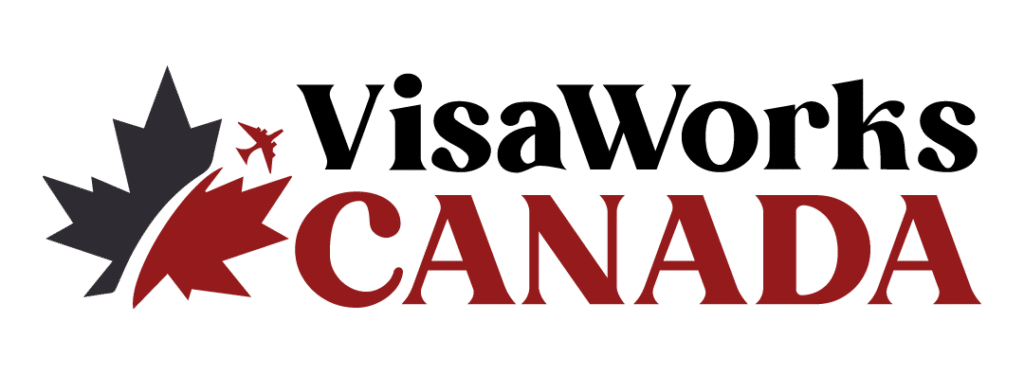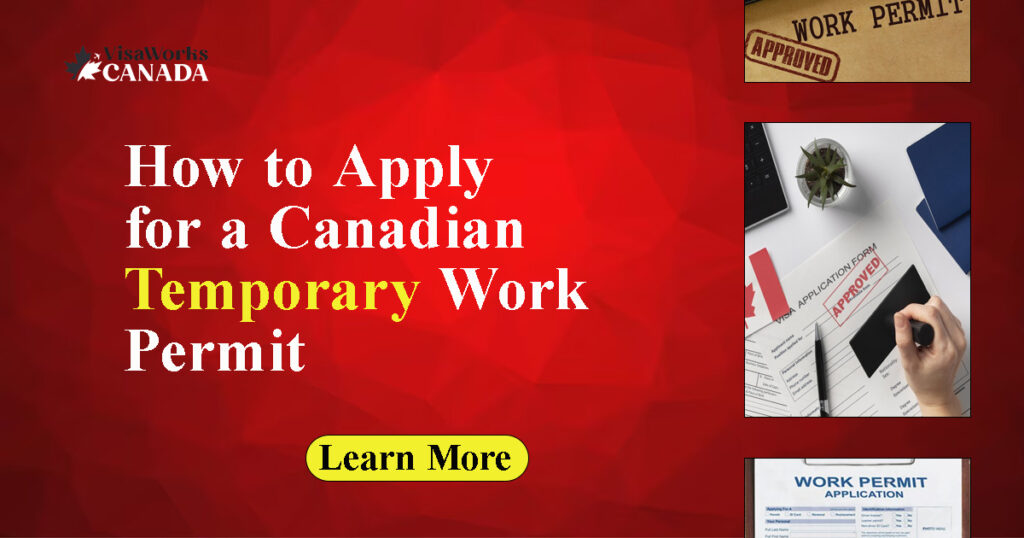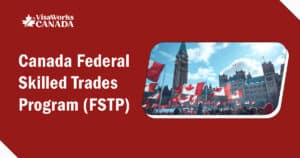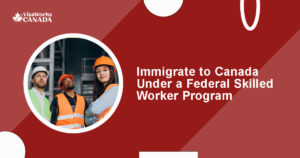Why a Temporary Work Permit is Your Golden Ticket? A temporary work permit allows you to work in Canada for a specific period. It is your gateway to new experiences, professional growth, and the possibility of permanent residency.
Canada is known for its welcoming atmosphere, vibrant culture, and abundant opportunities. Whether you seek to enhance your career, explore a new culture, or gain international work experience, Canada is the place to be.
Also read: How are Temporary Resident Permits Assessed?
Understanding the Canadian Temporary Work Permit
A temporary work permit is an official document that allows foreign nationals to work in Canada for a limited time. It is not a visa but a permit that accompanies your visa to enable employment.
Types of Work Permits:
Open vs. Employer-Specific. Open work permits allow you to work for any employer in Canada, while employer-specific permits restrict you to one employer and job. Understanding the difference is crucial for selecting the right permit.
Eligibility Criteria
Who Can Apply? Key Eligibility Requirements.
To be eligible, you must have a valid job offer from a Canadian employer, proof of sufficient funds, and meet health and character requirements. You must also show intent to leave Canada once your permit expires.
Job Offer: The Cornerstone of Your Application.
A legitimate job offer from a Canadian employer is essential. It must be in writing and include details about the job, salary, and working conditions.
Proof of Funds: Showcasing Financial Stability.
You must demonstrate that you have enough money to support yourself and any family members accompanying you. This includes proof of income or savings.
Researching Your Job Market
High-Demand Occupations in Canada.
Some jobs are in high demand, such as IT professionals, healthcare workers, and skilled trades. Researching these sectors can increase your chances of securing employment.
Finding the Right Employer: Tips and Resources.
Use online job portals, networking events, and recruitment agencies to find potential employers. Tailoring your search to regions with labor shortages can also be beneficial.
Securing a Job Offer
Crafting an Impressive Canadian Resume. Your resume should highlight your skills, experience, and qualifications relevant to the job. Keep it concise and tailored to Canadian standards.
Writing a Compelling Cover Letter. A strong cover letter should complement your resume. Explain why you are the perfect fit for the role and how your skills align with the employer’s needs.
Acing the Job Interview: Dos and Don’ts. Research the company, practice common interview questions, and dress appropriately. Be confident, concise, and courteous during the interview.
The Labour Market Impact Assessment (LMIA)
An LMIA is a document that an employer may need to hire a foreign worker. It shows that no Canadian worker is available for the job, and hiring a foreign worker won’t negatively impact the Canadian labor market.
The LMIA Application Process Explained. Your employer must apply for an LMIA from Employment and Social Development Canada (ESDC). The process involves proving the need for a foreign worker and the efforts made to hire a Canadian.
Exemptions from the LMIA Requirement. Some jobs are exempt from LMIA, such as positions under international agreements, certain academic and research roles, and intra-company transfers.
Preparing Your Application
Gathering Necessary Documents: A Comprehensive Checklist. Collect essential documents such as your job offer, passport, proof of funds, and medical exam results. Ensure all documents are up-to-date and translated if necessary.
Completing the Application Forms: Step-by-Step Guide. Fill out the necessary forms accurately. Double-check for completeness and correctness to avoid delays or rejections.
Crafting a Convincing Statement of Purpose. Your statement should explain why you want to work in Canada, your qualifications, and your future plans. Make it clear, compelling, and personal.
Submitting Your Application
Online vs. Paper Application: Which to Choose? Online applications are faster and more convenient, while paper applications can be used if online submission is not possible. Choose the method that best suits your situation.
How to Submit Your Application Online. Create an account on the Immigration, Refugees, and Citizenship Canada (IRCC) website. Follow the instructions to upload your documents and pay the fees.
Mailing Your Application: Ensuring Safe Delivery. If you choose to mail your application, use a reliable courier service. Ensure your package is complete and correctly addressed.
Biometrics and Medical Examination
Biometrics include your fingerprints and photo, which help verify your identity. You will need to provide these at a designated collection point.
Medical Examination: Health Requirements and Procedures. A medical exam is required to ensure you are in good health and do not pose a risk to public health in Canada. Schedule an appointment with an approved panel physician.
Application Fees and Payment Methods
Application fees vary depending on the type of permit and whether you are including family members. Check the current fee schedule on the IRCC website.
Accepted Payment Methods. Fees can be paid online via credit card or through other methods specified by IRCC. Ensure your payment is processed to avoid delays.
After Submission: What to Expect
Application Processing Times. Processing times vary based on your country of residence and the type of permit. Check the IRCC website for current estimates.
Checking Your Application Status Online. Use the online portal to monitor your application’s progress. Regularly check for updates or additional document requests.
Additional Steps for Family Members
Including Your Spouse: Spousal Open Work Permit. Your spouse may be eligible for an open work permit, allowing them to work for any employer in Canada while you hold your permit.
Study Permits for Minors. If you have children, they will need study permits to attend school in Canada. Ensure you apply for these permits along with your work permit.
Interview Process
Preparing for the Work Permit Interview. If required, prepare for an interview by reviewing your application and understanding the job offer. Practice answering potential questions clearly and confidently.
Common Interview Questions and How to Answer Them. Be ready to discuss your qualifications, job duties, and intentions in Canada. Provide honest and concise answers.
Approval and Next Steps
Receiving Your Work Permit: What It Looks Like. Once approved, you will receive a work permit specifying your job, employer, and duration of employment. Keep this document safe.
What to Do if Your Application is Approved. Plan your travel to Canada, inform your employer, and prepare for your move. Review any additional instructions provided with your permit.
Denial of Work Permit
Common Reasons for Denial. Applications may be denied due to incomplete documents, lack of eligibility, or security concerns. Understanding these reasons can help you address issues in future applications.
Steps to Take if Your Application is Denied. If denied, you can appeal the decision, reapply with corrected information, or seek legal advice. Identify and rectify any issues that led to the denial.
Arriving in Canada
Port of Entry Procedures: What to Expect. Upon arrival, present your documents to the border services officer. Be prepared to answer questions about your job and stay in Canada.
Meeting with Border Services Officers. Answer all questions truthfully and provide requested documents. They will verify your permit and grant you entry to Canada.
Settling in Canada
Finding Accommodation: Temporary and Permanent Options. Start with temporary housing such as hotels or short-term rentals. Explore permanent options once you settle in.
Setting Up Your Finances: Banking and Taxes. Open a Canadian bank account, apply for a Social Insurance Number (SIN), and understand your tax obligations.
Health Insurance: Accessing Canadian Healthcare. Register for provincial health insurance if eligible. Consider private health insurance for additional coverage.
Your Rights as a Temporary Worker
Understanding Your Employment Rights. Familiarize yourself with your rights, including fair wages, safe working conditions, and protection from discrimination.
Workplace Safety and Employment Standards. Follow workplace safety regulations and report any hazards. Understand employment standards such as working hours and overtime.
Extending or Changing Your Work Permit
Apply for an extension before your current permit expires. Provide updated documents and reasons for the extension.
If changing employers, you may need a new work permit. Obtain a new job offer and, if required, a new LMIA.
Permanent Residency Pathways
Temporary workers have pathways to permanent residency, such as the Canadian Experience Class or Provincial Nominee Program.
Explore programs like Express Entry, which fast-track permanent residency for skilled workers. Determine your eligibility and apply.
Tips for a Smooth Application Process
Common Mistakes to Avoid. Double-check your application for errors. Incomplete or incorrect information can delay processing.
Insider Tips from Successful Applicants. Learn from others who have successfully obtained work permits. Network, seek advice, and stay informed about updates.
Conclusion
Obtaining a Canadian temporary work permit opens doors to numerous opportunities. By following the steps outlined in this guide, you’re on the path to a rewarding experience in Canada. From securing a job offer and submitting your application to settling into your new life, each step is crucial.
While the process can seem complex, thorough preparation and determination are key to success. Embrace the journey, stay focused, and remember that challenges are part of the growth process.
For expert assistance, VisaWorks Canada Ltd. offers comprehensive services, including guidance on work permits, permanent residency, and study visas. Contact us now for personalized help.
FAQs
1. How long does it take to process a Canadian temporary work permit application?
Processing times vary depending on factors such as your country of residence and the volume of applications. Generally, it can take several weeks to several months. Check the Immigration, Refugees, and Citizenship Canada (IRCC) website for current estimates.
2. Can I apply for a Canadian work permit without a job offer?
In most cases, you will need a job offer from a Canadian employer to apply for a work permit. However, there are some exceptions, such as the International Experience Canada (IEC) program, which allows young adults from participating countries to work in Canada without a job offer.
3. Can I extend my Canadian work permit?
Yes, you can apply to extend your work permit if you meet certain eligibility criteria. It’s important to apply for an extension before your current permit expires to maintain legal status in Canada.
4. Can my family accompany me to Canada on my work permit?
In many cases, yes. Your spouse or common-law partner and dependent children may be eligible to accompany you to Canada on an open work permit or study permit, respectively.
5. What happens if my Canadian work permit application is denied?
If your application is denied, you may have the option to appeal the decision or reapply with additional information. It’s important to carefully review the reasons for the denial and address any deficiencies in your application.
6. Can I work for any employer in Canada with a temporary work permit?
It depends on the type of work permit you have. An open work permit allows you to work for any employer in Canada, while an employer-specific permit restricts you to working for the employer named on the permit.
7. Do I need to undergo a medical examination for a Canadian work permit?
In some cases, yes. Depending on your country of origin and the type of work you will be doing in Canada, you may be required to undergo a medical examination to ensure you meet the health requirements for entry.
8. Is there a limit to how long I can stay in Canada on a temporary work permit?
Yes, temporary work permits are issued for a specific period, typically tied to the duration of your job offer. You must leave Canada before your permit expires unless you apply for an extension or transition to another immigration status.
From expert visa services to comprehensive guidance on permanent residency, study visas, and business ventures in Canada,, Contact VisaWorks Canada Ltd. now for personalized assistance.









